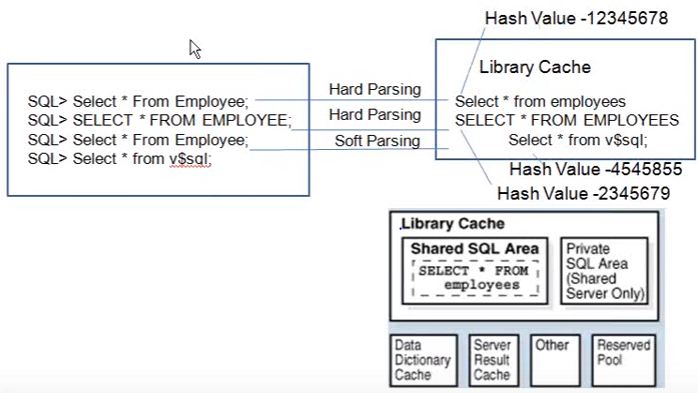SQL Query Processing
Let us discuss what happens inside oracle when we write a SQL query and press the green color execute button on the SQL Developer application.
I have only highlighted a small portin of the oracle architecture to explain the SQL processing in oracle.Let dive into the topic.
Lets first focus on how SQL is processed by oracle
- Main memory of Oracle is the SGA (System Global Area)
- There is a memory space called Shared Pool inside SGA
- Any SQL we write is stored in the Library Cache inside shared pool
Once we write the query SELECT * FROM EMP, this is stored in the Library Cache (Parsing)
- Oracle checks if the same select is present in the Library cache or not (It is case sensitive so if same query is written in two cases then it will consider it as all together different query).If it is not present then it will copy the query in the memory.So best practice is to be consistent with the case of your select query so that oracle need not copy the query into memory again.
- If the query is not present then oracle will copy the query in the memory (Hard Parsing)
- If query is found then oracle will not copy the query again (Soft Parsing)
- Every select statement in the library cache is associated with a Hash value (its a unique value representing a query)
- SELECT * FROM V$SQL WHERE SQL_TEXT LIKE ‘%empid%’; is the query to find the Library cache queries
- Parsing time will be high if the number of sql queries hitting the db is high.
What the hell is Parsing?
- Syntax is checked
- Semantic Parse (Checking validity of tables and columns and checks the rights of user)
- Loading SQL in Library cache (Hard or Soft Parsing)
- Based on Statistics it will create Execution plan of that SQL (Stats is stored in data dictionary in oracle. Statistics -> As of now what is the information of the table)
- Lastly oracle will try to fetch the data in minimal time and using minimal resources.
Hard Parse vs Soft Parse
- Since memory area allocated to the shared pool is finite, so when we start the oracle instance it will occupy memory area into the RAM.Within the RAM(1gb), SGA(20mb) is present,Shared Pool(5mb from the 20mb).
- Since the library cache has a small memory, the query that comes first into the memory goes out first (FIFO- First in First Out or LRU-Least Recently Used)
- So if you have executed some sql in the morning then you wont find it in the memory in the evening because many people have executed sql queries.
- During hard parsing a lot of table views are update by oracle, so try to avoid hard parsing.
- Every SQL is assigned a hash value and SQL Id
- Bind variable can be used to reduce hard parsing.The query stored in the oracle table is using the variable name instead of the variable value.
I encourage you to go through the oracle docs for the detailed working of the Oracle architecture.
If you have a little more patience, you can wait for me to post it in my blog in simplified way.
Top Posts
- RANK, DENSE_RANK, FIRST and LAST Analytic Functions
- Partitioned Tables And Indexes in Oracle
- GROUP BY Functions in Oracle
- PIVOT Function in Oracle
- Cardinality and Index in Oracle

